Medically review by Kim Langdon
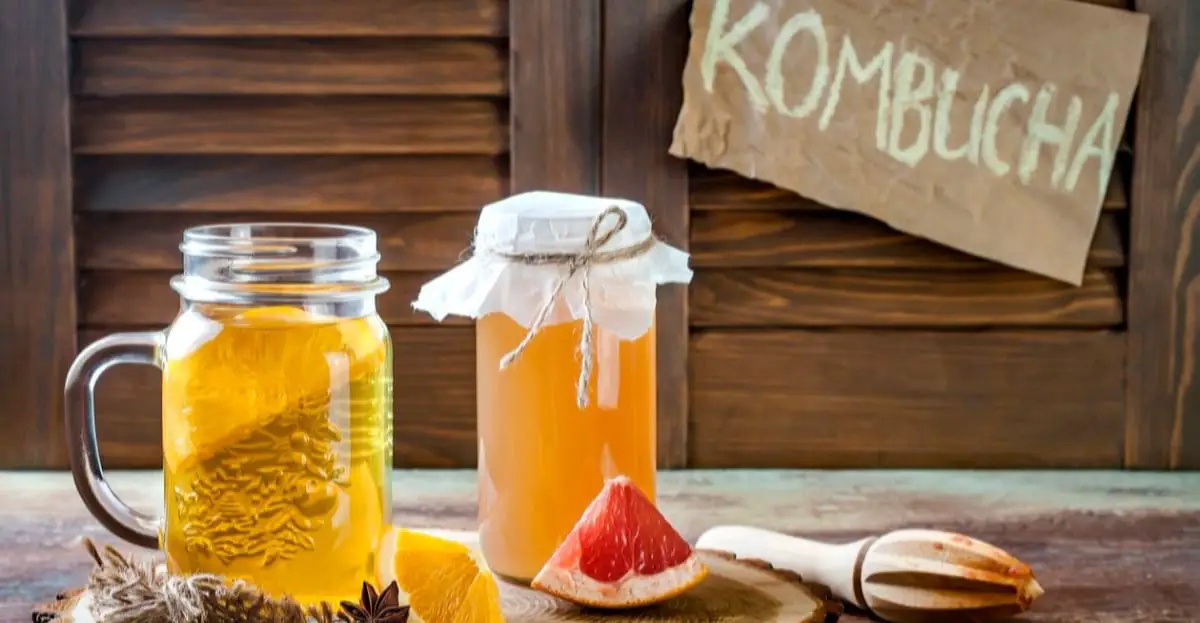
Today, we're talking about delicious, bubbly, and gut-friendly kombucha. This trendy drink has taken the world by storm lately.
Does it live up to the hype?
It's actually been around for quite a while, so really, we're just catching up. Aren't we always?
Kombucha is easily found in stores, and it's even easier to make at home with a few inexpensive, simple ingredients.
In fact, the DIY option will save you tons of money down the line.
Don't worry - we'll talk all about how you can get your brew on at home after we discuss the benefits of kombucha and exactly what it is in the first place.
What is Kombucha?
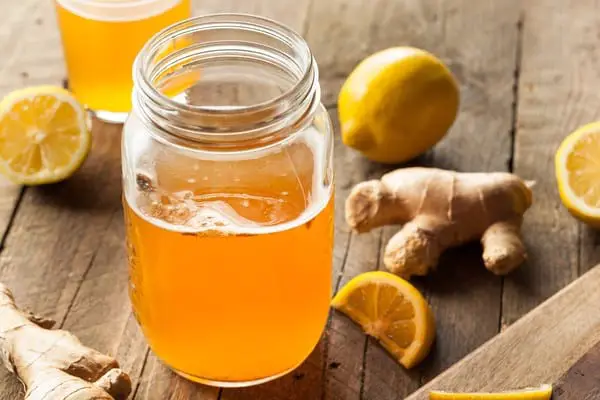
Kombucha is a fermented, carbonated tea drink made with cane sugar and black tea.
Basically, you let a vat of sweet tea sit on the counter for a while with a culture made of a symbiotic culture of bacteria and yeast a.k.a. a SCOBY.
It sounds a little weird, right? Don't let it turn you off.
It does have a slightly vinegary taste, but the different fruits and spices used to flavor each batch - in addition to sugar - will help make it more palatable.
After the process of fermentation which can take weeks, the liquid is a blend of tea, vinegar, enzymes, B vitamins, probiotics, acetic acid, gluconic acid, and lactic acid.
It also contains a slight amount of alcohol which is clearly stated on most commercial products' labels.
These beneficial compounds join forces to create a superfood, or rather, a super drink.
In the end, a batch of kombucha will contain four primary probiotics or types of healthy bacteria: gluconacetobacter, acetobacter, lactobacillus, and zygosaccharomyces.
It is thought to have originated in Northeastern China but its exact roots aren't well known.
In China, kombucha is referred to as the Immortal Health Elixir, so we can assume they're quite fond of the beverage.
It has been home-brewed for many years across the world now, but only recently - within the past decade or so - has there been such a surge in commercial kombucha products.
You can likely find a dozen brands at a large health food market.
Whether you love your daily dose of 'booch' already or you are brand new to the trend that's sweeping grocery store drink coolers with dozens of flavors and varieties, kombucha is worth getting up close and personal with. Perhaps you'll even make your own.
The benefits of kombucha & probiotics
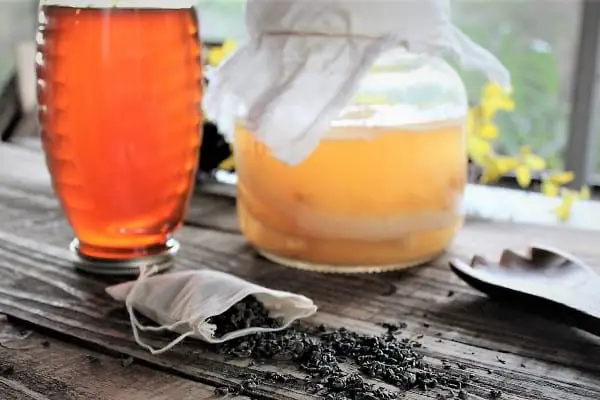
Kombucha has long been considered a "functional" beverage, basically meaning it has a purpose beyond hydration or taste.
Most notably, it contains a concentrated dose of probiotic power, and we know probiotics are fantastic for gut health.
After all, gut health is the foundation of all health and well-being (at least we think so!).
While there is, unfortunately, a severe lack of scientific evidence that discusses drinking kombucha, many experimental studies have been done.
Moreover, many anecdotal claims have been notes, and people report feeling loads better with their daily dose of kombucha.
A long list of beneficial properties has been linked to regular consumption. Should you be taking some as your daily medicine?
Here is what you can expect.
1. It promotes gut health and gut permeability
One of the most - if not the most - telling signs of gut health is the diversity of bacteria that resides within the intestinal lining.
When the kombucha is left to ferment with the SCOBY, it takes on a new life.
All of those probiotics, amino acids, and enzymes are fantastic for our bellies.
Tons of bacteria colonize in your jar, ready to immigrate to your gut and deliver their bounty.
Introducing healthy bacteria to the gut is crucial to keeping the gut strong and intact. Basically, the more good bacteria you have, the better defense you have.
This means less bad bacteria entering the realm and messing with the order of things.
The good bacteria - or pathogens - are here to fight, and they're fighting the good fight!
This "overpopulating" tendency of the bacteria that occurs when we regularly supplement with probiotics or a probiotic-rich food like kombucha is also good to crowd out other unwanted "visitors" like candida.
Candida is essentially an overgrowth of yeast, so the good bacteria sort of moves it out naturally.
2. It's a natural "detox" juice
Forget whoever is marketing you a "detox" or a "cleanse." If your vital organs are in working order, your body is doing its job to detox itself just fine.
However, a daily dose of kombucha can aid the process and keep you in the best shape possible. It's an enhancement agent if you will.
An all-natural one.
Because kombucha has a relatively high antioxidant content, it can help to reduce oxidative stress and damage in the body.
The liver takes the brunt of that damage.
Considering the body's natural detox mechanisms are highly compromised when the liver isn't working right, consuming antioxidant-rich kombucha can aid in liver health.
Kombucha is also rich in Glucaric acid which also helps the liver to detox.
3. It has disease-fighting properties
When we look at disease in a holistic way, we can see where it stems from: our cells.
When we look at cellular health and mitochondrial function, we understand that inflammation plays a crucial role.
Like I mentioned above, the antioxidant properties of kombucha already reduce inflammation at a cellular level by reducing oxidative damage done to the cells.
Considering we already know both black tea and green tea to be antioxidant powerhouses that have disease-fighting properties on their own, adding in the additional properties of a fermented food increases its potential substantially.
Tea polyphenols and antioxidants are anti-cancer and can reduce liver toxicity disease.
The four main disease-fighting properties that have been attributed to kombucha are detoxification, anti-oxidation, energizing potencies, and promotion of depressed immunity, according to this research.
4. It may help with blood sugar management
Blood sugar management is an especially important part of daily health and diet choices for those with type 2 diabetes, but it's also imperative for folks who want to avoid diabetes, people with metabolic disease, or pre-diabetic diagnoses.
In this animal study, kombucha consumption suppressed increased blood glucose levels while also improving the absorption of good cholesterol and decreasing the bad.
Finally, it protected the liver and kidney function(s) of diabetic rats.
Essentially, this promising research indicates that kombucha has the potential to be both a protective agent for preventing diabetes and also an effective treatment for those who already have type 2 diabetes.
5. It may improve digestion
Because of the potential the bacteria in kombucha has to improve gut health and the variety of bacteria that thrive within us, we can also expect digestion to improve.
Unsurprisingly, digestion is rooted in the gut.
Digestion is truly an assembly line and starts the second we begin to chew (or drink, in this case), but the most prominent piece of the puzzle is undoubtedly the processing that takes place in the gut.
The bacteria ingested with kombucha like to line the digestive tract, offering up their services as a 'protective' layer of sorts.
With improved inflammatory markers and less inflammation in the gut, a healthy colony of varied bacteria, and better gut permeability, we can no doubt expect improvements in our digestion.
It should be noted that people with autoimmune disease(s) that impact digestion such as IBS or Crohn's should use caution when using fermented foods to improve symptoms as they can help, but can also backfire.
6. It can boost your mood
Many healthy foods can ease anxiety, reduce mild symptoms of depression, and lift your mood slightly. Kombucha is one of those foods.
You can feel justified in stopping by the store to grab one as an afternoon pick-me-up! Why is that? Well in this case, it really comes down to the nervous system.
See, the nervous system is the control center where hormones are regulated and released as needed.
Cortisol - the stress hormone - sometimes gets released in excess which elicits a "fight or flight" reaction in us, and leaves us feeling wired, anxious, and on-edge.
The multitude of B vitamins including mood and energy-boosting B12, vitamin C, and amino acids found in kombucha help to feed the nervous system, keeping it in tip-top shape.
Moreover, it's worth noting that our gut is often described as the 'second brain.'
It controls a lot of what goes on with our bodies, and not just our bellies!
There is a MAJOR gut-brain connection, and treating gut health can also improve mental health.
This can be done by supplementing with probiotics and/or eating probiotic-rich foods like kombucha.
7. It's antibacterial & antimicrobial
Antibacterial and antimicrobial foods can make a big difference for us, fighting off unwanted bacteria and microbes.
For example, research shows that kombucha's antimicrobial properties can ward off pathogenic bacteria as well as species of Candida or yeast overgrowth in the gut.
Furthermore, acetic acid - which is naturally found in kombucha - can potentially kill harmful microorganisms found in the body.
Oh, and it might even kill off bacteria that make us sick like staph, E. coli, salmonella and Campylobacter jejuni (or what causes many cases of food poisoning).
8. It can improve the immune system
Immunity begins in the gut. By improving gut health, we improve everything from digestion to mental health to our immune systems.
Plus, vitamin C content and antimicrobial/antibacterial properties naturally help us ward off yucky infections and viruses.
Make sure to stay sippin' through cold and flu season to improve your defenses!
In order to receive all of these amazing benefits, it's important to purchase or produce unpasteurized kombucha.
This process will significantly reduce if not entirely diminish the bacteria content and healthy cultures that call kombucha home.
Look for products labeled raw, and when making kombucha at home, bottle and drink it in a timely manner to reap the benefits.
What is the difference between kombucha & jun?
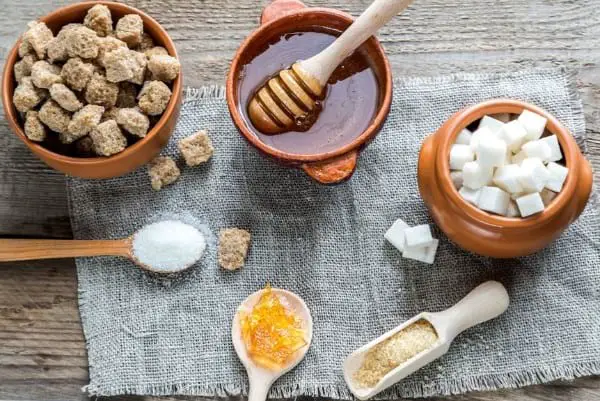
If you dig around in the grocery store coolers or online for fermented food recipes, you're going to see plenty of kombucha.
You'll likely see your fair share of jun tea as well.
To get straight to the point, the primary difference is the sweetener used. Both drinks are fermented teas.
When making kombucha, cane sugar is necessary because it feeds the bacteria.
However, all bacteria needs to thrive is a bit of sweetness. Kombucha is also mostly brewed with plain black tea.
In jun tea, honey is the source of food for those healthy bacteria. Moreover, jun tea is brewed with green tea.
It is often referred to as "the champagne of kombucha." Rightfully so!
It's a bit lighter than kombucha which is known to pack a punch. There's no denying its flavor is strong!
Jun tea provides a milder, softer refreshment with plenty of bubbles to go around - hence the comparison to champagne.
If we try to trace jun tea back to its origins, we get lost. It's actually a rather mysterious drink which adds to its allure.
It is generally thought to have been a spiritual elixir drank by the people of China and Tibet, but it may be something we just made up once we caught wind of kombucha and how awesome it is.
We don't really know if it was a primary or secondary invention, but we do know fermentation has been around a long while.
Jun tea makes a good alternative to kombucha because it uses honey which some people prefer to ingest over white sugar.
While this is generally what we recommend, the fermentation process eats away at most of the refined sugar you use to make kombucha leaving you with a naturally sweet sip.
Either way you swing, all you need is a SCOBY and your preferred choice of sweetener to get started.
Oh, and some glass containers. More on that now...
How to make kombucha
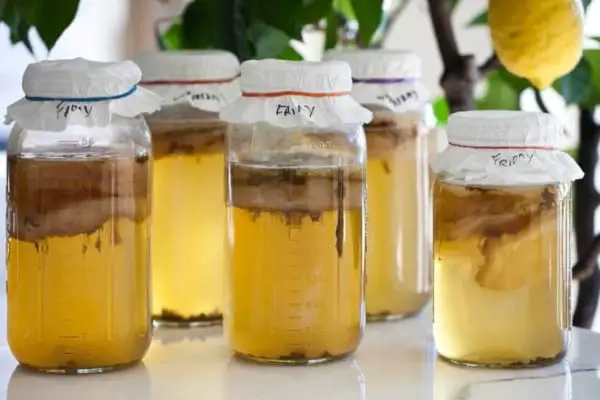
Making kombucha at home is quite simple, cheap, and easy to do.
You don't need very many materials to get started or maintain your brew, nor is there a steep start-up fee.
Moreover, it's a very hands-off recipe considering most of the "prep time" is passive a.k.a. the fermentation process.
Basically, you toss a few things in a jar (with love and care), then let it sit.
Soon enough, it'll be ready to drink. It's appealing to even the laziest kitchen connoisseurs.
Important note: Do not use metal containers under any circumstances for brewing kombucha (the tea is fine in a metal pot) or storing kombucha.
Even stirring the mixture into the jar with a metal spoon can be damaging both to the overall taste of your batch and the quality/health of your SCOBY which you will use over and over again.
Pay close attention to the specifications for the material needed to make your own kombucha.
Materials:
- A 1-gallon glass jar or crock. You can also use two 2-quart glass jars
- A stock pot for brewing the tea
- Tight-weave cloth like cheesecloth, or coffee filters for straining
- Jar lids or rubber bands to securer cloth
- A wooden spoon for stirring
- 16-oz. glass bottles for bottling the product - preferably with swing tops/a tight-sealing lid to maintain carbonation
- Small funnel
Ingredients:
- 8-10 black or green tea bags, or 2-3 tbsp. of loose-leaf tea (unflavoured)
- 1 cup of granulated white sugar - do not use coconut sugar
- 3.5 quarts of water
- 2 cups of kombucha from last batch or from the store OR distilled white vinegar
- 1 SCOBY per jar - you cannot ferment without one!
Instructions:
- First, brew the tea. Bring the water to boil in a stockpot and dissolve the sugar in it. Shortly thereafter, remove the pot from the heat to halt the boil and add your teabags. Let them brew for the appropriate amount of time and cool the brew completely. You can use the ice bath method for this, but do not put the pot in the refrigerator or add ice cubes to the water to speed up the process. Patience is key throughout your brewing journey!
- Second, add the starter tea or vinegar. Once your tea has cooled, remove the bags or infuser and add in your kombucha or vinegar. This establishes an acidic base that deters unwanted and unhealthy bacteria from taking up residence in your brew which can cause some nasty side effects like mold, while also driving out good bacteria.
- Now, it's time to transfer your batch. The tea will ferment in its designated glass jar. Before adding the SCOBY, transfer the cooled tea mixture to a clean glass jar (or multiple glass jars). When you've finished, add in the SCOBY with clean hands, gently.
- Next, cover the jars. Many jars will have an air-tight lid sized to fit the top, but fermentation requires air so avoid using these. Instead, place cheesecloth, a breathable towel, tight-weave cloth, or a coffee filter over the top and secure it with the outer ring of a metal lid or a rubber band. Paper towels or tightly woven cloth options will prevent fruit flies if you're prone to them or brewing in the summertime.
- Finally, it's time to wait. Leave the jar for 7-10 days. Check the kombucha for mold. You can generally scoop it off it it's only on the top, but you'll otherwise want to throw away any moldy brew. However, you should be able to avoid this by checking up on your jar daily.
- After 7 days, you can taste the kombucha. Now, the fermentation process is done. The bacteria has formed, the sugar has mostly been eaten away, and it's mostly about personal preference in terms of whether or not it's ready to serve.
- Remove the SCOBY and begin the next batch. The SCOBY won't survive on its own. In order to keep it alive, you have to continuously brew kombucha.
- Bottle your kombucha. With a funnel, transfer the fermented tea to an air-tight bottle to carbonate. At this point, you will also want to add flavors you like. Herbs, spices, fruits, and fruit juice are good choices for customization.
- Carbonate your kombucha. Leave the bottles on the counter out of direct sunlight for 1-4 days to form bubbles. Once you refrigerate your kombucha, it will stop fermenting and carbonating. Now, you can drink up!
We hope you learned everything you ever wanted to know about the benefits of kombucha, how to make your own kombucha and more about this fantastic elixir today in our post.
It makes a healthy alternative to soda if you are trying to cut back on sugar or lose weight, plus improves gut health and fights disease. If you enjoyed this article, make sure to share it!
This article was fact checked for accuracy by Dr. Kim Langdon, MD. As always, this is not personal medical advice and we recommend that you talk with your doctor.
Share on Pinterest

Kimberly Langdon M.D. is a retired University-trained obstetrician/gynecologist with 19-years of clinical experience. She delivered over 2000 babies to mothers in a suburban Midwestern community.

